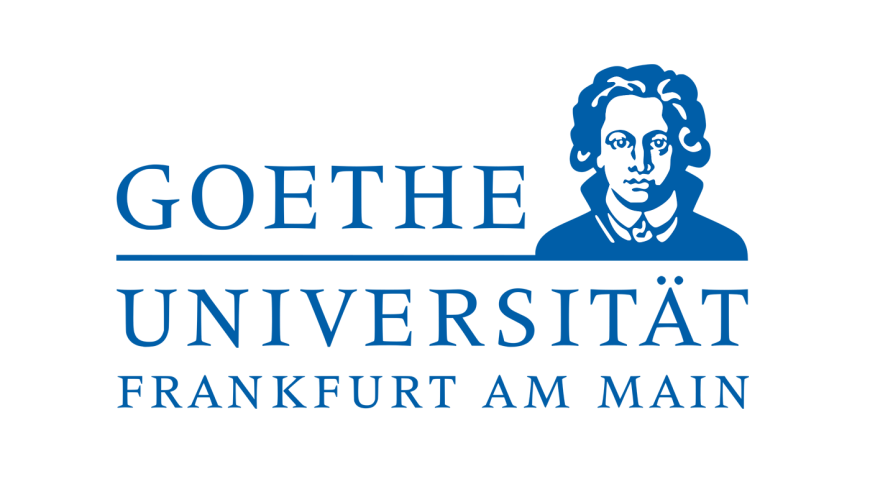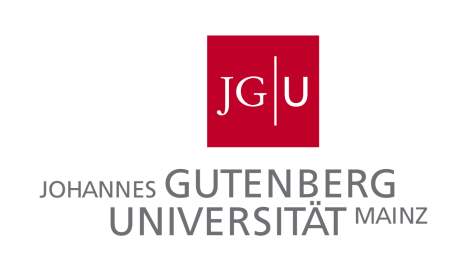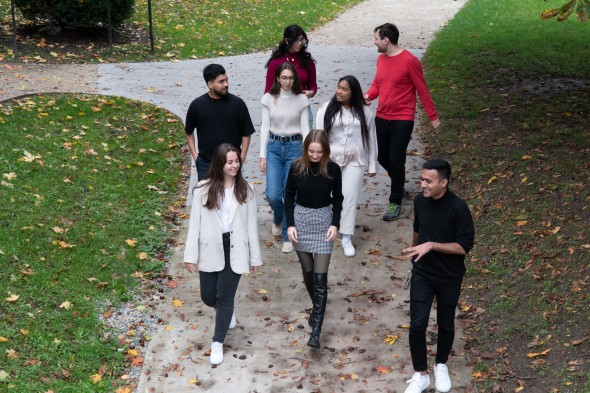Published: 21st February 2022, last edit: 10th March 2025
Maria,
Medical Engineering B.Sc.
Studying at two universities is always varied and exciting. We spend one day a week in Frankfurt and experience a completely different kind of university there. That's remarkable, because that doesn't happen in other degree programmes.
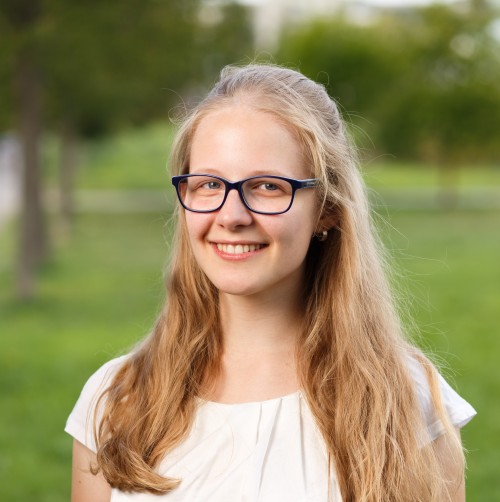
RMU: Studying in Darmstadt, Frankfurt and Mainz
The Rhine-Main metropolitan region is an exciting location for research. Innovative perspectives from business and science come together here and offer many opportunities, especially for students. But that's not all: there is also a lot going on in research and teaching in the Rhine-Main region. In order to provide the 100,000 students in the region with the most comprehensive range of knowledge possible, three universities have joined forces to make it possible for you to study across universities. The RMU degree programme allows students from Goethe University Frankfurt, Johannes Gutenberg University Mainz and TU Darmstadt to be enrolled at up to three universities in two federal states at the same time without paying additional fees. This allows you to attend courses from different subject areas and supplement your studies with the strengths of the other universities. Welcome to the Rhine-Main Universities, or RMU for short!
The RMU – that's TU Darmstadt, Johannes Gutenberg University Mainz and Goethe University in Frankfurt am Main. Top universities that conduct research together in their alliance, offer an even broader range of courses and pool their expertise in innovative cooperative study programmes. Maria's degree programme, Medical Engineering, is a result of this cooperation, as is the Soft Matter and Materials (M.Sc.) course. If that's not your thing – no problem! Other programmes, such as International Studies / Peace and Conflict Research M.A. or Political Theory M.A., are also designed as collaborations between TU Darmstadt and Goethe University and include various courses at both universities. And the future also holds exciting things in store for you: The existing cooperative study programmes are to be supplemented by others.Whether there will be new cooperative study programmes? We will keep you up to date. In addition to such cooperative degree courses, there is also the option of taking advantage of the courses offered by the other two universities without enrolling on another Bachelor's or Master's degree course: the so-called “RMU degree course”.
Dr. Henriette Reinecke ,
Department II, Head of Student Services
The aim of RMU studies is to look beyond one's own course of study, to broaden one's own subject horizon or to take an interest-based look at other courses of study or modules that do not exist here at TU Darmstadt. The so-called “RMU study programme” can be taken on a semester-by-semester basis and for individual modules, and it is possible to participate in the courses offered by the respective universities at a very low threshold and without additional fees.
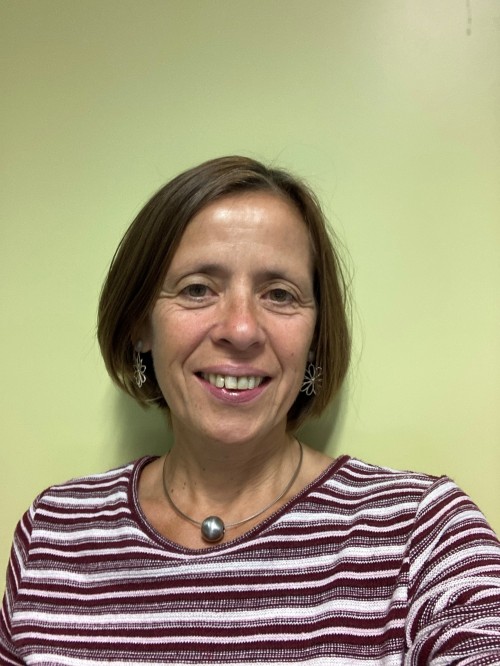
Simply studying at three universities – how does it work?
In addition to these cross-university degree programmes, the RMU degree programme offers all students at the three universities the opportunity to take individual courses at RMU. This means that you can choose courses from a total of 630 degree programmes at three universities with around 30 departments! You are then enrolled at up to three universities at the same time and can take the courses released in the RMU course catalog. You will also receive an additional student card that gives you access to the libraries. So if you have more than one passion, are curious, have an interest in a different subject area or individual modules, you can easily expand your study options in the region, as Henriette Reinecke, Head of Student Services, explains. “RMU students are fully-fledged members of the respective university and are then enrolled at RM University on the 'RMU Studies' cooperative degree course for one semester in addition to the actual degree course at their home university. If you have registered for the RMU course, you can also register for the examination and receive a transcript of records. This can then be submitted to your home university for recognition if necessary.” However, this should be discussed with your home university beforehand, says Ms. Reinecke.You decide for yourself whether you want to take further RMU modules in the next semester by re-registering or not. And although you are enrolled at two universities, you do not pay double semester fees. All this is free of charge for students at the three RM universities.
If you're worried that additional exams might be too much for you, don't panic: “You don't have to take the exam. You decide for yourself whether you want to take the exams. However, there are no so-called 'Sitzscheine',” says Ms. Reinecke: ”The exam is the only proof of participation.” It is therefore important that you coordinate courses at other universities, especially if you would like to have the credit points recognized as part of your compulsory elective modules, for example, with the study office beforehand. The recognition of exams is regulated by each university itself.
Maria,
Medical Engineering B.Sc.
At the beginning, I couldn't imagine how exactly it would work with the two universities. Then it turned out that we are in Frankfurt one day a week. It's really nice to walk along the banks of the River Main in Frankfurt and take a lunch break when we have a little more time.

Melis,
M.Sc. Biomolecular Engineering
I took an RMU module in my second Master's semester. The lectures took place partly at TU Darmstadt and partly at JGU Mainz. I was also able to listen to lectures by professors from JGU and Frankfurt Goethe University. It was a great experience!
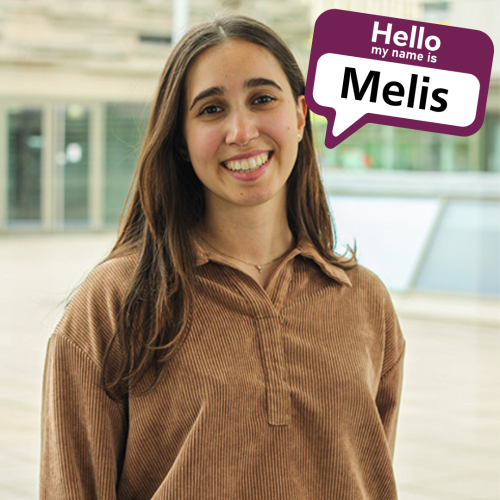
Close networking and intensive exchange
The RMU sees itself not only as a platform for joint learning and research, but also as an engine for interaction at various levels. There is close networking between the three universities and with the region. Exchanges in science management and administration are actively promoted, while job shadowing and the reciprocal opening of internal further education courses strengthen cooperation.
In addition to university cooperation, the Rhine-Main universities also work intensively with non-university research, industry, international organisations and cultural institutions in order to dynamically develop the Frankfurt-Rhine-Main science region. These collaborations also strengthen the transfer of knowledge and mutual support between the various players.
In addition, there is the Startup Academy to further promote innovation and entrepreneurship in the region. The RMU and its start-up centers are working together on the project. These are HIGHEST (TU Darmstadt), Goethe-Unibator and JGU Startup Center as well as the Startup Office of Mainz University Medicine. This means that start-up teams will receive even better support and start-up advice will be expanded.
Global presence and collaborations
As internationally oriented universities, the Rhine-Main Universities aim to further enhance their presence and attractiveness in the global education market. This is achieved not only through connections with partners in business and society but also through participation in programmes such as the Mercator Science-Policy Fellowship Programme, which brings together researchers and leaders from politics and society. A structured exchange of perspectives fosters dialogue between academia and decision-makers.
Additionally, the universities are actively involved in the Dual Career Network Rhein-Main to enhance the region’s professional appeal, particularly for researchers relocating to the area with their partners.
Ongoing programmes and support for early career researchers
The strategic alliance of the three universities also supports early-career researchers. Postdocs benefit from tailored programmes designed to facilitate their transition into the non-academic job market. To this end, networking and career events are offered, rotating across the different university locations to foster exchange between institutions.
Biomedical Engineering B.A.: My everyday study life between Darmstadt and Frankfurt
Maria is studying Medical Engineering, a cooperative degree programme established within the RMU framework. Her studies take place between TU Darmstadt and Goethe University in Frankfurt am Main. We asked her about her experience, what a typical week looks like, and how she benefits from this exciting collaboration: “When I discovered the Medical Engineering programme, I thought it was cool that Frankfurt was included as a second location. At first, I couldn’t quite imagine how studying at two universities would actually work. But it quickly became clear: we simply spend one day a week in Frankfurt. That accounts for 20 percent of the courses in my studies. In Frankfurt, we have lectures in the morning, followed by seminars in the afternoon, and at the end of the semester, we take some of our exams there. The other 80 percent of the coursework takes place at TU Darmstadt, where we learn the fundamentals of electrical engineering, mathematics, and physics.
Of course, besides lectures and seminars, we also take part in practical training in electrical engineering and medicine, gaining hands-on insights into various disciplines. Over time, the boundaries start to blur more and more. For instance, we have a medical engineering internship in Darmstadt, as well as biomechanics and biomaterials courses in Frankfurt. These subjects are no longer just about the human body itself but rather about the methods and materials used on or inside the body.
The learning materials are provided to us online via TU Darmstadt’s platforms, including those from Goethe University Frankfurt. However, sometimes I do notice that I’m studying at two different universities. There are different teaching concepts and structures, which is also due to the fact that I’m studying two very different disciplines. Electrical engineering is taught in a completely different way than medicine. The organization differs as well. In Frankfurt, for some courses, we don’t have a single fixed lecturer but rather multiple specialists from different medical fields. For example, in radiology, we learn from experts in MRI, X-ray imaging, and CT scanning.Another advantage is that, while students usually organise their schedules quite independently—with a seminar here and a lecture there—our one fixed study day in Frankfurt automatically adds more structure to our routine. There’s also a semester-long plan, so we always know what to expect, which is really convenient. One of the best things about studying in Frankfurt is taking a walk along the Main river or having lunch there when we have extra time, the campus is located right by the water.
Applying for the joint degree programme was as simple as applying for any other programme—I just applied through TU Darmstadt. However, I study at both universities and even have two student IDs. With our semester ticket, we can easily travel to Frankfurt for our classes and also have access to the libraries at both locations. And if any issues arise, there are contact persons at both universities who are there to support us. I’m so happy with my studies that I plan to continue with a master’s degree in Medical Engineering and keep studying in both Darmstadt and Frankfurt.”
Maria,
Medical Engineering B.Sc.
Officially, everything is organized by TU Darmstadt. I am a TU student, but I also have an ID card from Goethe University in Frankfurt. The application and teaching materials are also made available online via the TU's platforms.

Researching together!
We haven’t even mentioned the joint research efforts of the RMU yet! The Rhine-Main Universities collaborate to refine their research profiles and develop joint projects and research alliances. With their broad range of disciplines, they tackle key interdisciplinary scientific questions of the future.
Through this collaboration, internationally visible research priorities are established, allowing the universities to connect across disciplines and position the Rhine-Main region as an integrated, globally attractive, and competitive hub for science.
Since 2016, 16 joint research projects have been funded through the Initiative Fund for Research, receiving multimillion-euro support. These include fascinating projects such as the development of 3D-printed bone replacements—super interesting, right? But that’s not all! There are outstanding research collaborations across various fields that you should definitely check out!
Besides the third-party funded collaborative research projects, including more than two DFG-funded special research areas and transregios, in which two or all three universities are significantly involved, this scientific space is also further expanded through innovative networks and the excellence strategies of the universities. The strategic alliance of the Rhine-Main universities commits itself to a free, open, and transparent science, which is considered an essential factor for scientific progress and the transformation of society.
RMU for all
Do you feel like thinking outside the box? Then look towards the various options available to RMU students. Maybe you would like to experience other lectures and departments here and there. Taking an additional lecture in economics or politics is particularly easy. And a breath of fresh air at a different campus can sometimes be quite nice. Especially if it means you can go for a walk along the rivers Rhine in Mainz or Main in Frankfurt before heading home.
If you would like to read more reports about experiences at RMU, you can check out the articles by Enes and Merve. David and Ceylan are also getting a taste of other disciplines in their studies.
How do I apply for the RMU study programme?
Did we make you curious? If you are interested in the concept of the RMU or the mentioned study programmes, here is everything at a glance once again:First of all, you must apply for RMU studies at the respective RM university. This is very easy. As proof, you only need to submit a semester certificate from your home university. You will then be enrolled in RMU studies for one semester alongside your regular studies and receive a corresponding ID. In the following semester, you decide upon re-registration whether you want to continue RMU studies. If you do not re-register, the RMU status automatically expires.
Who can participate in RMU studies?
RMU studies can be chosen by students of Goethe University Frankfurt and Johannes Gutenberg University Mainz. Students of TU Darmstadt must contact the mentioned partner universities for RMU studies.
Which courses can you choose?
Each university publishes, within its course catalog, a subject-structured list of courses that are open for RMU studies. You can freely choose from this catalog and register through the respective university’s registration channels. In general, only courses from non-restricted study programs are possible, which are offered by the lecturers for RMU studies in the respective semester.
Application at TU DarmstadtThe application for RMU studies at TU Darmstadt is done via TUCaN. You must first register on the website and create a TUCaN applicant account. Then, you can apply online by selecting the “RMU special programme” in the course offerings and uploading the current enrollment certificate from your home university (JGU Mainz or GU Frankfurt). After a successful application, you will be enrolled in RMU studies and receive your RMU student ID from TU Darmstadt.
Deadlines and required documents
- Application for the summer semester: 01.12. to 30.04.
- Application for the winter semester: 01.07. to 31.10.
- Required documents: A current enrollment certificate from the home university (no further documents required).
Costs and credit transfer
- No semester fee is required.
- Exams and earning credit points are possible. However, the recognition of study achievements acquired in RMU studies for your own degree program must be clarified with your home university.
Further information
Further information can be found on the TU Darmstadt website and in the RMU FAQ. The TU Darmstadt study office and the Central Student Advisory Service offer assistance.
Re-registration & de-registration
From the summer semester of 2025, re-registration for the next semester will take place automatically.
If you want to learn more about the Rhine-Main region as an exciting research location, you can find more information in Diego’s blog post “Darmstadt as a science hub.”
TU Darmstadt is also a member of the European network “Unite!” This works similarly to RMU studies: You can take courses and joint degree programmes at the European partner universities. More information can be found in our blog post “Unite! – studying together from Finland to Portugal.”

Maria
Hey, I'm Maria. I am one of the first to study medical engineering at TU Darmstadt. Since I like to try out new things, it suits me very well. At TU Darmstadt, I was particularly impressed by the methods used to bring medical engineering closer to students. This strict separation between medicine and technology and the fact that the two subjects are only brought together at a later stage is something I have never seen before at any other university. In addition, the cooperation between two universities (Frankfurt and Darmstadt), which are very well known in their respective fields (medicine and technology), is of course also appealing about this study program here.




